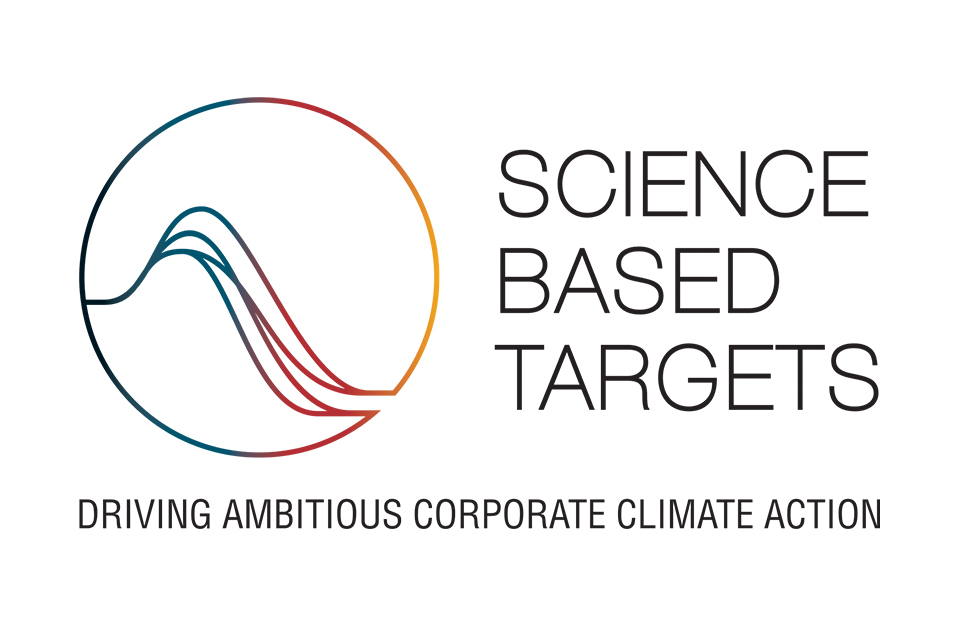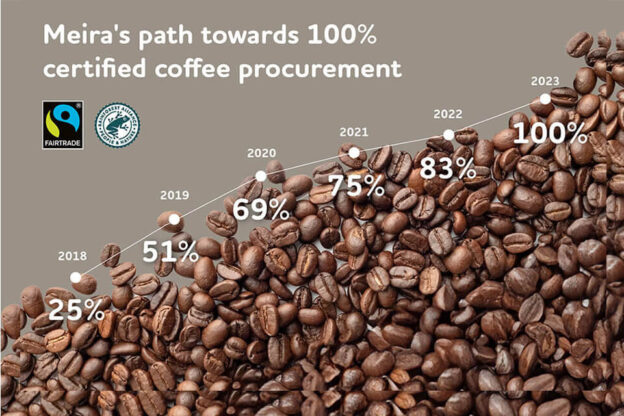Sustainability is one of Meira’s strategic priorities and values, that can truly be seen in the strategic decision making as well as in daily operations. Meira’s sustainability programme is based on UN Sustainable Development Goals and has four main pillars: Sustainable & tasty products, Science-based climate act, Responsible factory in Vallila district and Good workplace for Meirans.
Meira’s Greenhouse gas emission reduction targets were approved by the Science Based Targets initiative in April 2022. The emission reduction targets for Meira’s own operations (scope 1 and 2) are in line with the Paris climate agreement to keep global warming to 1.5 degrees.
Over 36% cut in emissions from own operations
Meira has reduced the emissions caused by its own operations (so called scope 1-2) by approximately 36% since 2019. The emission reduction was achieved by switching to renewable wind electricity and by making energy use more efficient in Meira’s factory.
“In my opinion, every individual, company and state as well as international communities should do their part in the battle against climate change. At Meira, we are very committed to this work. We switched to renewable wind electricity in 2020, and we are constantly looking for ways to make energy use more efficient in our factory and property. We have e.g. added intelligence to our property automation and changed our ventilation machines to more energy-efficient ones. Improving energy efficiency is of course on everyone’s mind these days because of the energy crisis,” says Raimo Sinisalo, Managing Director of Meira.
In addition to electricity, Meira’s operations and property use natural gas, biogas and district heating. Meira is committed to reduce the so-called absolute scope 1 and 2 emissions by 80 percent by 2028 compared to 2019 emissions. This means switching to emission-free forms of energy, i.e. from natural gas to biogas and renewable district heating.
It is critical to involve value chain partners in climate work
Meira has calculated the emissions of the value chain outside of its own production (so-called scope 3) in accordance with the standard of the Greenhouse Gas Protocol (GHG Protocol). Most emissions in Meira’s entire value chain, approx. 98%, are generated outside of its own operations.
“Since most of the emissions from our operations are generated in our value chain (so-called scope 3), we are committed to involve our partners in climate work. In practice, this means that we encourage and support e.g. our suppliers to measure emissions and set reduction targets for their operations. For example, activities related to coffee cultivation (especially fertilizer production and usage) have a large impact on emissions. In the coming years, we will focus on further researching this, and supporting farmers in reforming climate-friendly and efficient agricultural practices.”, says Marleena Bask, Director of Strategy, Sustainability and Communications at Meira.
Meira Oy’s Science-Based Targets:
- Meira Oy commits to reduce absolute scopes 1 and 2 GHG emissions 80 % by 2028 from a 2019 base year*.
- Meira Oy commits to reduce absolute scope 3 GHG emissions from upstream transportation and distribution and waste generated in operations 50 % over the same time frame.
- Meira Oy commits that 90 % of its suppliers by emissions covering purchased goods and services will have science-based targets by 2025.
*The target boundary includes land-related emissions and removals from bioenergy feedstocks.
More information:
Marleena Bask
Meira’s Director of Strategy, Sustainability and Communications
+358 50 352 3643
[email protected]
What is The Science Based Targers initiative (SBTi)?
The SBTi is a partnership between CDP, the United Nations Global Compact, World Resources Institute (WRI) and the World Wide Fund for Nature (WWF). The SBTi Defines and promotes best practice in emissions reductions and net-zero targets in line with climate science. Science-based targets provide a clearly-defined pathway for companies and financial institutions to reduce greenhouse gas (GHG) emissions, helping prevent the worst impacts of climate change and future-proof business growth. Targets are considered ‘science-based’ if they are in line with what the latest climate science deems necessary to meet the goals of the Paris Agreement – limiting global warming to well-below 2°C above pre-industrial levels and pursuing efforts to limit warming to 1.5°C. https://sciencebasedtargets.org/




